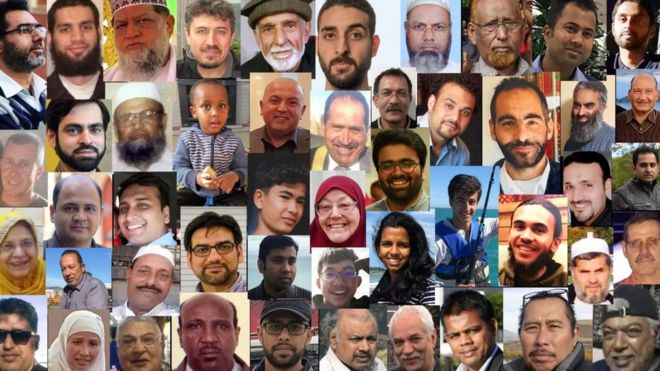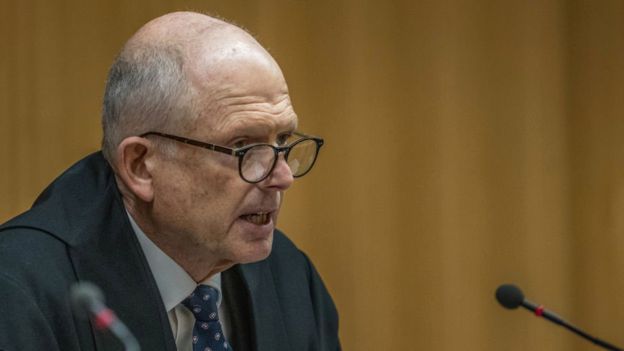Christchurch mosque assault: Brenton Tarrant condemned to existence without the chance for further appeal
 |
| Image Credit: BBC |
A racial oppressor who executed 51 individuals at two mosques in New Zealand will serve life in prison without the chance for further appeal - the primary individual in the nation's history to get the sentence.
Australian Brenton Tarrant, 29, admitted to the homicide of 51 individuals, endeavored murder of another 40 individuals and one charge of psychological oppression.
The adjudicator called Tarrant's activities "brutal", saying he "demonstrated no kindness".
The assault last March, which was live-streamed, stunned the world.
Tarrant's condemning additionally denotes the principal fear-based oppression conviction in New Zealand's history.
"Your wrongdoings are evil to the point that regardless of whether you are confined until you pass on, it won't exhaust the prerequisites of discipline," said Judge Cameron Mander in a Christchurch court on Thursday.
On forcing a sentence of existence without any chance to appeal, Justice Mander stated: "In the event that not here, at that point when?"
A sentence without the chance for further appeal implies the wrongdoer won't be allowed the chance to leave jail in the wake of serving just a part of their absolute sentence.
Equity Mander said such life sentences without the chance for further appeal were held uniquely for the "most exceedingly awful homicides".
New Zealand doesn't have capital punishment as a component of its equity framework.
New Zealand Prime Minister Jacinda Ardern, after knowing about Tarrant's condemning, said it implied he would have "no reputation, no stage... what's more, we have no reason to consider him, to see him or to get notification from him once more".
"Today I trust is where we have any reason to hear or express the name of the psychological militant," she said.
The shootings incited New Zealand to pass stricter firearm laws and repurchase particular sorts of weapons from proprietors.
What did the adjudicator state?
On the most recent day of a four-day condemning hearing, Justice Mander went through right around an hour helping Tarrant to remember every individual he killed and harmed.
He included that notwithstanding the shooter's blameworthy supplications, the shooter seemed "neither remorseful nor embarrassed".
Tarrant, who said through a legal advisor in court that he didn't contradict the indictment's application for an existence without any chance to appeal the sentence, didn't respond to the sentence. He had before likewise declined the option to talk at his condemning.
The condemning hearing started on Monday, with a huge piece of the initial three days devoted to hearing casualty sway articulations.
Tarrant showed up generally aloof in the course of recent days, as just about 90 casualties - some lamenting, others rebellious - stood up to him.
Sara Qasem, whose father Abdelfattah Qasem kicked the bucket at the Al Noor Mosque, discussed the last snapshots of his demise, saying: "I wonder in the event that he was in torment, on the off chance that he was terrified, and what his last contemplations were. Also, I wish beyond what anything on earth that I could have been there to hold his hand and disclose to him it would all be OK."
She battled to keep down her tears, before taking a gander at Tarrant and saying "these tears are not for you".
How did survivors and family members respond?
Ahmed Wali Khan, who lost his uncle in the assaults, told that the Muslim people group in Christchurch invited the decision.
"Everybody was very cheerful that equity has been served," he stated, including that the network had been "hanging tight for this choice for an exceptionally significant time-frame".
Taj Kamran, an Afghan outcast who was shot a few times in the leg and still requires strolling bits of help, said he would "have the option to rest" after the decision, however it would not restore the individuals who were lost.
"No discipline will bring our friends and family back and our bitterness will proceed for the remainder of our lives," he told the AFP news office.
Irfan Yunianto, a doctoral understudy from Indonesia who endure the shootings, said he was eased that the shooter had at last been condemned.
"I was at the shooting area. A large number of my companions kicked the bucket. I likewise witnesses for myself how my companions were attempting to spare the people in question," he said.
"I acknowledge the court choice with great beauty," he included. "Following this preliminary has been extremely hard, however I despise everything watched it on the web. After the decision has arrived at I felt so mitigated in light of the fact that the court at long last conveyed its last decision."
Tarrant got the greatest conceivable sentence in New Zealand, which doesn't have capital punishment.
"We are not in a nation where we can anticipate capital punishment. However, they have served equity, giving the greatest jail time without any chance to appeal," said Hina Amir, 34, who was outside Al Noor mosque when Tarrant started his assault.
What occurred in Christchurch?
The shooter started shooting at two mosques in the city on 15 March a year ago.
He originally focused on admirers inside the Al Noor mosque. Under 30 seconds after the fact, he came back to his vehicle to get another weapon and afterward reappeared the mosque and continued discharging on those inside.
The whole episode was communicated on Facebook Live through a headcam he was wearing.
He at that point headed to the Linwood Islamic Center where he shot two individuals outside and afterward took shots at the windows.
A man from inside hurried outside and got one of the assailant's shotguns before pursuing him away.
Two cops at that point pursued and captured the shooter. After his capture, he advised police that his arrangement was to torch mosques after his assault and he wished he had done as such.
During the current week's condemning, the court heard that the shooter intended to focus on another mosque however was confined by officials in transit.
What do we think about Tarrant?
The 29-year-old racial oppressor has been depicted by Australian Prime Minister Scott Morrison as a "fanatic, conservative fear monger".
He was conceived in the Australian province of New South Wales to a dad who was a city worker and a mother who was an instructor.
After the passing of his dad in 2010, he quit his place of employment and went through pieces of Asia and Europe.
His grandma told media source 9News that she accepted these movements transformed him, saying: "It's just since he voyaged abroad I feel that kid has changed - totally to the kid we knew".
He moved to New Zealand in 2017 and began arranging his assaults against the Muslim people group.
He was dynamic on periphery online discussions and posted a 74-page "statement" online preceding his assault.
"I picked guns for the influence it would have on social talk, the extra media inclusion they would give and the influence it could have on the legislative issues of the United States and consequently the political circumstance of the world," he wrote in his proclamation, as indicated by a New York Times report.
Tarrant added that he additionally would have liked to "make strife between the two philosophies inside the United States on the responsibility for so as to encourage the social, social, political and racial gap".
He likewise said that he would be "immediately overlooked" after the assault, including that he wouldn't fret this.
How did New Zealand react?
The assault incited New Zealand to change its weapon laws.
Not exactly a month after the shootings, the nation's parliament cast a ballot by 119 to 1 on changes forbidding military-style quick-firing weapons just as parts that could be utilized to construct disallowed guns.
The administration offered to repay proprietors of recently illicit weapons in a repurchase plot.
Ms. Ardern has said "considerably more" should be done to stop radicalization in the nation.
"The test for us will guarantee in our ordinary activities, and each open door where we see tormenting, provocation, prejudice, separation, getting it out as a country," she said on the principal commemoration of the assaults.
 |
| Getty Image |


No comments